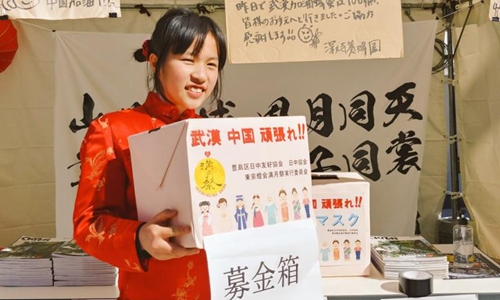HOME >> OPINION
Japan’s aid shows neighbors help neighbors
By Chen Yang Source:Global Times Published: 2020/2/9 17:48:41

A 14-year-old Japanese girl raises donations for Wuhan, capital of Central China's Hubei Province and epicenter of outbreak of the novel coronavirus, on Saturday in Tokyo, Japan. She did the same on Sunday. Photo: Courtesy of the Executive Committee of the Tokyo Lantern Full Moon Festival Ikebukuro 2020
The novel coronavirus (2019-nCoV) has been spreading from Wuhan, capital of Central China's Hubei Province, to other Chinese regions since mid-January, leading to a quickly growing number of infected patients. Amid the epidemic, Japanese government, local governments, social groups, and firms in Japan have donated masks, protective outfits and other medical supplies to Wuhan and other Chinese cities, which has touched the hearts of Chinese people. Chinese Foreign Ministry spokesperson Hua Chunying on Tuesday said at a press briefing that China appreciates Japan's sympathy, understanding and support of China's fight against novel coronavirus epidemic.
China and Japan are neighboring countries separated only by a strip of water and it is the obligation of one to help the other during difficult times. In the aftermaths of 2008 Wenchuan earthquake which killed roughly 70,000 people, Japan generously offered China relief funds and aid. Many ordinary people in China expressed their thanks to Japan through the Japanese Embassy in Beijing.
Following the 9.0-magnitude earthquake and tsunami in Japan in 2011, the Chinese government provided its neighbor 30 million yuan ($4.5 million) worth of emergency humanitarian assistance and sent a rescue team to help the search and rescue efforts. Throughout Chinese society, diverse types of aid were offered during Japan's time in need, and Japanese society showed its appreciation of China's generosity.
Although the 2008 Wenchuan earthquake and 2011 earthquake and tsunami in Japan were years in the past, the memory of one country providing assistance to the other during a disaster has become imbedded in the minds of Chinese and Japanese people, and will provide an inexhaustible impetus to their continued mutual assistance in the future.
As China has spared no efforts to combat the 2019-nCoV, the aids provided by Japanese society is not just payback for China's assistance during Japan's 2011 earthquake and tsunami, it's the normal response of neighbors helping neighbors. Although China-Japan ties have experienced ups and downs, both countries have offered, and will continue to deliver, assistance to the other when disasters strike. This signals the true nature of China and Japan's friendly relationship.
Since the turnaround in bilateral ties in 2017, although there have been frequent official interactions between China and Japan, people-to-people communication has been limited.
On the one hand, exchanges between the two governments have been ratcheting up. The resumption of the China-Japan strategic dialogue and China-Japan defense ministerial meeting have not only further advanced bilateral ties, but also boosted political and mutual trust between the two governments.
On the other, people-to-people exchanges between the two societies have been insufficient. Compared to the massive and rising number of Chinese tourists traveling to Japan, the number of Japanese visiting China is small. While an increasing number of Chinese people have begun to improve their understanding on Japan, Japanese people's knowledge of China appears to have been constrained. This is inconsistent with the warming of bilateral ties. According to the Japan-China Joint Opinion Survey 2019 conducted by the Generon NPO and China International Publishing Group, 45.9 percent of Chinese respondents say they have a "favorable" impression of Japan, while 84.7 percent Japanese hold an "unfavorable" impression of China.
Moreover, we cannot be overly optimistic about the prospect of bilateral relations. Japanese Prime Minister Shinzo Abe has been seeking a constitutional amendment that would expands his country's military, and there are other constraints that prevent China-Japan ties from thawing.
Fortunately, the nongovernment-initiated aid provided to China by Japan to fight 2019-nCoV and the Chinese people's active show of appreciation show that people-to-people ties between the two countries are warming up.
There have already been confirmed cases of infection with the novel coronavirus in Japan. The virus has become a common foe of both China and Japan. The battle against 2019-nCoV shows the people around the world are connected and must join hands to combat these difficulties and challenges. It's expected China and Japan will engage in further cooperation to fight the virus.
The author is a media professional and an observer of Japan issues. opinion@globaltimes.com.cn
RELATED ARTICLES:
Posted in: ASIAN REVIEW